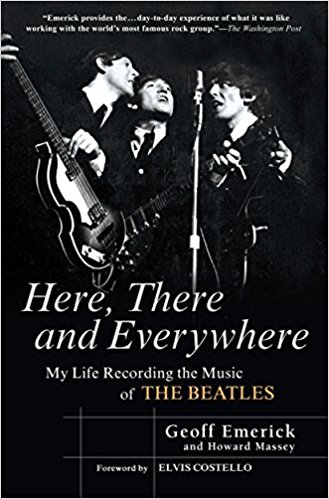No Longer With Us: Geoff Emerick, Legendary Beatles Engineer, Passes at 72

Geoff Emerick, who passed today of congestive heart failure, had been open about sharing his work with The Beatles and others, even penning a book on the subject.
I read the news today oh no…
For a long time, I’ve kept a mental list of people that I was particularly glad are among us. Just knowing that they were out there, somewhere, walking the Earth at that moment made me feel good. Members of my private club include Beatles Paul McCartney and Ringo Starr, and until yesterday their pioneering engineer, Geoff Emerick.
Emerick’s passing due to a heart attack concludes one of the greatest audio engineering tales ever told. By now, most in the audio trade are familiar with his meteoric rise, being in the right place at the right time to begin engineering for the Beatles’ at just age 15. An apprentice at EMI, he was there when John, Paul, and George Harrison recorded their first sessions with Ringo, bearing witness to the tracking of “Love Me Do.”
Soon enough, he was executing for producer George Martin, rising to Chief Engineer for their 1966 album Revolver, then 1967’s landmark Sgt. Pepper’s Lonely Hearts Club Band. The White Album, Abbey Road, and the “Penny Lane/Strawberry Fields Forever” dual single were all under his aegis. In the decades that followed, Elvis Costello, Michael Jackson, Stevie Wonder, Cheap Trick and many more called on him as clients.
An Unassuming Inspiration
Fortunately for us all, Emerick was generous about sharing his experiences with the Beatles. I remember being riveted by the excellent 2007 book he co-authored with Howard Massey, Here, There and Everywhere: My Life Recording the Music of the Beatles. It’s an intimate account of his career, with plenty of behind-the-scenes insights on the brilliance of John, Paul, George and Ringo, as well as how beastly the Beatles could be to themselves and others. As a window not just on their brilliant creative process, but also the rapid evolution of audio engineering at the time, it’s an account not to be missed.
His appearances at Beatles gatherings of all kinds were regular occurrences. But he wasn’t just seen at the fanfests. Those of us who regularly attended the annual AES Convention came to count on his casual presence there, simultaneously regal and unassuming. With his incredible sonic accomplishments, Emerick had absolutely nothing to prove. Instead, like the rest of us, he was there to learn and educate — and happily shake hands with starstruck audioheads who were absolutely gaga to meet him.
Stranger Than Fiction
And why wouldn’t they be? While I’m sure his personal life was as complicated as anyone else’s, he truly lived the audio dream. In fact, if you wrote out Geoff Emerick’s story as a film script, it would appear ridiculously far-fetched: Driven by desire and wild fortune, fall into recording one of the world’s most influential artists, and help to leave an everlasting imprint on global culture in the process.
The recordings will remain the same, but for me the sound of the Beatles will now be slightly altered. That subconscious comfort I drew from knowing that Emerick was occupying the planet must now depart, dissipating just as it did with the passing of George Harrison, John Lennon and George Martin. What remains are the gifts he helped craft for billions of ears, enabled by his instinctive ability to make the Beatle’s adventurous musical visions real on the likes of “Tomorrow Never Knows,” “Being for the Benefit of Mr. Kite” and so many more.
He leaves behind a miraculous discography crazily top-heavy with classics—impossible to believe if it weren’t really real. Geoff Emerick’s contributions to the world really can be heard here, there and everywhere.
— David Weiss
Please note: When you buy products through links on this page, we may earn an affiliate commission.







